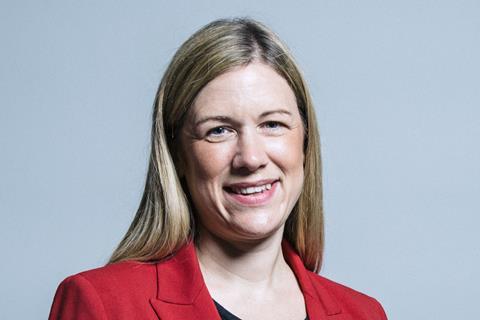Shadow solicitor general Ellie Reeves MP says violence against women and girls is ‘close to the top’ of her agenda. We are speaking during 16 days of ‘activism against gender-based violence’, a United Nations campaign that has special significance in 2020 – evidence from charities and helplines has borne out fears expressed at the start of March that lockdown and homeworking would increase domestic abuse.
Even without the pandemic, progress on stopping such violence has flatlined or declined by some measures. Vera Baird QC was Solicitor General in the last Labour government, and as Victims Commissioner the dramatic drop in rape convictions is a key preoccupation. Reeves and Baird are in regular contact on the issue.
‘I was an employment rights lawyer,’ Reeves, who was elected to parliament in 2017, begins, ‘so I’ve always done a lot of work in relation to women’s rights. I was doing a lot of discrimination work in the last few years of my legal career, I advised women and families around discrimination at work, discrimination of facilities, those sorts of issues, so I’ve long been an advocate for women’s rights. I got on to the Justice Select Committee where we continually looked at issues around CPS prosecution of rapes.’
Violence against women and girls, Reeves points out, can be linked to wider problems that the justice system faces. ‘More than 50% of women that sit in our prisons have been victims of domestic violence,’ she says. ‘That’s a really important statistic. I’m deeply concerned about it. In April this year I was appointed shadow solicitor general and the issue around domestic violence, rape and serious sexual violence have been close to the top of my agenda in that role. A lot of things are going on at the moment, but for me that is the thing that I keep coming back to and its very, very high up my agenda.’
‘The justice system is really letting down victims of rape and serious sexual violence, and victims of domestic violence,’ she continues. ‘There was backlog of cases pre-covid, for sure, there’s a combined total in magistrates courts and crown courts of half a million cases waiting to be heard and victims being told their trials won’t go ahead until 2022, and frankly it’s not good enough if you’ve been a victim of any crime. If you’ve been a victim of domestic violence or of rape… quite frankly you might end up giving up on the criminal justice system. And I think that it’s really worrying this huge backlog in cases. I think it’s really needs to be tackled.’

Reeves has specific criticisms of the government on this point. ‘First of all the government was very slow to get Nightingale courts up and running. More could have been done,’ she says, but adds that problems in the justice system pre-date the impact of Covid-19. ‘The cuts in the CPS means that cases just aren’t being dealt with as they ought to be.’
Tight resources have also limited the CPS and police’s ability to process digital data in rape and assault cases, she adds. I put it to her that the problem is not just one of resourcing though – society’s attitudes are by definition represented in juries. Just as they were once seen as failing to convict where a woman who alleges sexual assault had been wearing a short skirt, so now they misread the information thrown up by a ‘digital strip search’.
Reeves won’t consider limiting jury trials, though. ‘Jury trials are incredibly important,’ she argues. ‘I think there was some suggestion at the start of the pandemic that cases could be sped up by doing away with jury trials. I think that’s a really, really slippery slope to go down.’
Action is needed though, for jury trials to deliver a fair outcome. ‘It’s important that a lot of stereotypes are broken down,’ Reeves says. ‘Just because someone has sent a particular message or a particular picture to someone in the past doesn’t mean they can’t claim to be a victim of rape or serious sexual violence. I think that’s incredibly important. Not just for jurors but for the CPS in deciding which cases to take on. I know as part of the rape review the CPS are doing.’
Reeves says the CPS review should report sooner than planned (2025 is its possible delivery date). ‘Only one in seven victims have confidence that the justice system will deliver for them,’ she points out. ‘In 2019 2020 there were 55,000 reports of rape to the police. Just short of 1900 cases were charged by the CPS. Which is a tiny proportion. There is a really really serious issue here, I don’t think it can be explained away by saying the police are referring fewer cases. I think it is a lot more fundamental than that.’
Reeves regularly uses questions to the Attorney General to highlight violence against women and girls. But raising domestic violence in parliament, she says, is frustrating. ‘This government is good at saying we are supporting victims of domestic violence, but when you look at the actual statistics, when you look on the ground, the reality is quite different.’ For example, ‘we know there was funding that came for the domestic violence hotline that came from government. But we don’t know if that’s going to continue after march, so organisations and charities working in this sphere can’t plan. They don’t know if they can continue a lot of their core services beyond March. That isn’t right’.
The day we speak charity Victim Support UK published a report, which includes evidence that women who made allegations of violence and abuse received suggestions to use civil routes, such as non-molestation orders, rather than wait for a criminal justice outcome. It completes a picture of a UK response to violence against women and girls which is failing at every level.
Reeves concludes: ‘If the rape victims don’t have confidence in the criminal justice system; if victims are being told they have to wait till 2022, two years, for a trial; if rape prosecutions are at their lowest level ever; if people are told to go down the route of the civil courts because the criminal courts are overwhelmed - then the reality is that we’re far, far short of supporting victims where they need that support most. And that worries me a great deal.’
More information about the 16 days of activism can be found here.




































3 Readers' comments